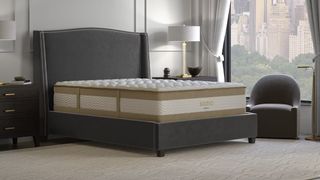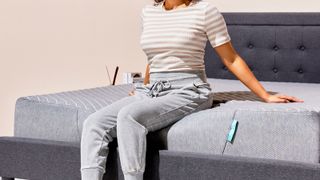I'm a sleep writer — 7 questions you should ask yourself before buying a new mattress
Before buying a new mattress in the 4th of July sales, ask yourself these 7 questions

If you’ve noticed your current mattress showing its age, you may well be in the market for a new one. But with so many mattresses on the market, how do you know which is the right one for you? As a sleep writer and mattress tester, there are seven questions I always recommend asking yourself before buying a new bed.
Even the best mattresses that meets all of your sleep needs will have a lifespan and, at some point, you’ll need to replace it with a newer, shinier option. But where do you start looking and what should you consider before you invest in a new mattress? It can be hard to understand all the mattress jargon and know what is most important to look for in a mattress. So, in this guide, I’ll answer the seven questions you should ask before spending your money.
With the upcoming 4th of July sales, now is a great time to buy a new mattress, with some sales already live. And, in the coming days, you’ll see even bigger discounts, with the chance to save some serious money. In the meantime, I’ll help you be ready and waiting, armed with all the knowledge you need for you next mattress buy.
7 questions to ask yourself before buying a new mattress
1. What position do I sleep in?
Although there’s no ‘one size fits all’ when it comes to mattresses, there are some basic rules of thumb to follow. The best mattresses for side sleepers have plenty of cushioning around the pressure points of the shoulders and hips, allowing these sleepers to sink into the mattress and avoid any pressure build-ups.
Back sleepers, on the other hand, need a medium firm mattress to help keep their spines aligned. I’d recommend one of the best hybrid mattresses on the market, with the combination of coils and foam providing plenty of support along with contouring. These mattresses could also be a great pick for combination sleepers.
Stomach sleepers need a firmer mattress that will help to keep their hips raised and spine aligned. The best mattresses for stomach sleepers aren’t necessarily ultra firm, but they will have superior lumbar support that keeps the hips from sinking into the mattress.
2. Do I have any aches and pains?

If you suffer with aches and pains, the wrong mattress could really aggravate these. The best mattresses for back pain will offer a balance of cushioning pressure relief, alongside firmer support for spinal alignment. It’s a common misconception that a firm mattress is the only sensible choice for back pain but, in fact, that’s not always the case.
Sign up to get the BEST of Tom's Guide direct to your inbox.
Get instant access to breaking news, the hottest reviews, great deals and helpful tips.
Whilst those with lower back pain, or those weighing over 230lbs might want to consider one of the best firm mattresses, our team’s extensive research suggests that a medium firm mattress is often more effective at countering pain. Our top pick is the Saatva RX, a medium firm mattress with enhanced back support and excellent pressure relief that’s designed for people with chronic back and joint pain.
3. Do I overheat at night?
If you’re a hot sleeper, then the wrong type of mattress can really exacerbate things, waking you up in the night and leaving you uncomfortably warm and uncomfortable. There are plenty of mattresses on the market that are naturally cooling due to the materials they use. For example, natural materials like wool naturally wick away moisture, helping to keep you cool at night.
Memory foam is notorious for trapping body heat, so is best avoided for hot sleepers unless it’s had cooling materials added to negate it. Brands add cooling infusions such as gel, graphite and charcoal, although there’s some debate as to how effective these actually are. Mattresses with very little foam, such as the Saatva Classic, can often be a better choice for those who sleep hot. For really hot sleepers, I’d recommend investing in one of the best cooling mattresses, which use specialist cooling tech such as phase change materials and GlacioTex covers.
4. Do I share my bed?
If you share your bed, you’ll want to consider how restless both you and your partner are at night and choose a mattress accordingly. Mattresses with good motion isolation mean that you won’t be disturbed by a partner tossing and turning at night as the bed itself will absorb the movement.
The best memory foam mattresses will generally offer the best motion isolation, with the layers of foam offering plenty of sinkage, keeping sleepers in one position overnight. But for those who are combination sleepers or need more support from their mattress, there are plenty of hybrid options that still offer excellent motion isolation. The DreamCloud mattress has plenty of cushioning comfort and support from its coil layer, but still offers plenty of motion isolation.

In addition to good motion isolation, a mattress with decent edge support will also allow sleepers to use the full width of the mattress, without running the risk of tipping out of bed. Stronger edge support also helps to support motion isolation. In addition, I’d recommend buying a larger mattress size, if space and budget allows. The best king size mattresses will give you a little extra room to spread out on, as well as giving you more distance from your partner if they’re restless while they sleep.
5. Do I suffer from any allergies?
If you suffer with allergies, you’ll want to make sure that your mattress doesn’t contain any materials that could aggravate these. Bedrooms are full of allergy triggers such as dust, pet dander and pollens, with these causing symptoms such as wheezing, itching and breathing problems, all of which can disrupt your sleep. While keeping your mattress and bedroom clean makes a big difference, investing in a hypoallergenic mattress might be necessary to keep any symptoms at bay.
Hypoallergenic mattresses use natural and organic materials, such as latex and organic wool and cotton. If you’re an allergy sufferer, I’d recommend checking out our best organic mattress selections, with mattresses that are also free of toxins, chemicals, fibreglass and heavy metals, all of which can also aggravate allergies.
6. What's my budget?

I’d always recommend buying the best mattress you can afford. A mattress is one of our most vital purchases – after all, we spend hours sleeping and sleep, of course, is vital to our wellbeing. So, it makes sense to invest in a decent mattress that will offer you plenty of support and comfort, along with a decent lifespan.
There are some decent cheap mattresses available, but I would personally recommend looking in the mid-range for the sweet spot of quality vs value for money. It’s also worth bookmarking our mattress sales page to keep an eye on the latest deals. Many brands rarely sell their mattresses at full MSRP and, if you wait for one of the major sales events in the year, you could pick up a higher quality mattress for a cheaper price.
7. Does my mattress really need replacing?
Finally, ask yourself - do you actually need to invest in a new mattress, or could one of the best mattress toppers be enough to improve your sleep? No matter how diligent you are about rotating and / or flipping your mattress, your mattress will start to develop some slight dips and sagging – particularly if you sleep in one position. A bed topper can also be used to cool down a mattress that sleeps a little too warm, as well as firming up or softening a mattress as required.
Of course, a topper isn’t always the answer. If your mattress is over 10 years old, you’ll need to replace it. There are also other key signs that suggest a new mattress rather than a topper is needed:
- The mattress has gone yellow.
- The mattress is scuffed or has large dips or sagging in the surface.
- The mattress is torn.
- You sleep better in any other bed.
- You wake up in the night because you can’t get comfortable.
- You wake up with more aches and pains than you went to sleep with.

Jo Plumridge is an experienced mattress reviewer with several years' experience covering all things mattresses and sleep, and who tests memory foam, hybrid and organic mattresses. What Jo doesn't know about a boxed mattress isn't worth knowing, so naturally we tasked her with producing a series of features for Tom's Guide looking at all aspects of mattresses, from how to pick between latex and memory foam (it's a tricky one), to the seven mistakes people make when buying a mattress for the first time. When testing the DreamCloud Luxury Hybrid for Tom's Guide, Jo said: "I loved the back support and pressure relief it offered. Plus, it looks far more expensive than it is." When she isn’t writing about sleep, Jo also writes extensively on interior design, home products and photography.


